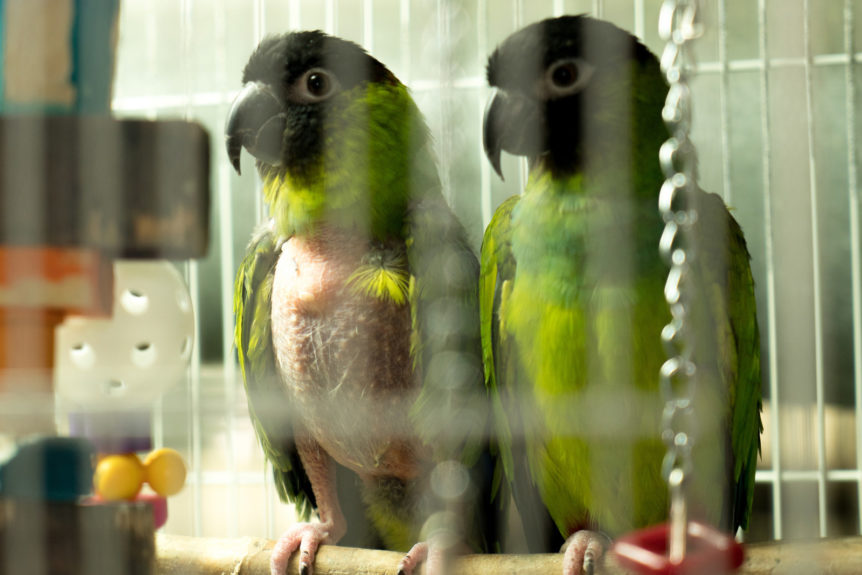- Like
- Digg
- Tumblr
- VKontakte
- Buffer
- Love This
- Odnoklassniki
- Meneame
- Blogger
- Amazon
- Yahoo Mail
- Gmail
- AOL
- Newsvine
- HackerNews
- Evernote
- MySpace
- Mail.ru
- Viadeo
- Line
- Comments
- SMS
- Viber
- Telegram
- Subscribe
- Facebook Messenger
- Kakao
- LiveJournal
- Yammer
- Edgar
- Fintel
- Mix
- Instapaper
- Copy Link
This week, the ASPCA discovered over 600 birds crammed into a private residence near Columbus, OH. Among the birds were parakeets, parrots, cockatiels, macaws, and others. After responding to a public complaint about concern for the living conditions of the birds, Columbus Humane called in the ASPCA and all of the birds are now in their care and receiving medical treatment and foster placements.
Outrage over Animal Cruelty
As you can imagine, the internet is rightfully upset about this case of live bird “hoarding.” No one wants to see animals of any kind in this state. Many of the birds in this case were found showing signs of neglect, including being overcrowded in cages, lacking proper care and medical attention, and some missing feathers.
If your heart is aching for these birds, we get it.
Unfortunately, these cruel conditions are a reality for billions of birds crowded on filthy factory farms in the United States every year.
It’s easy for us to only get upset about these conditions when thinking about birds that we view as “pets” and companions. But the reality is that chickens farmed for food or exploited for their egg production live every day in conditions even worse. And just like parrots and cockatiels, chickens are sentient birds who experience fear and discomfort–living creatures entitled to a life in livable conditions.
Neglect and abuse of companion animals is unacceptable. Why are farmed animals any different?
Parrots and Chickens–What’s the Difference?
From childhood, many of us are socialized to see some animals as friends and some as food. Chickens are reduced by the meat industry to their parts or a label (breast, thigh, nugget), which helps us turn a blind eye to the individual who suffered and was killed for these products. However, even though the poultry industry wants us to believe otherwise, the chickens on our plate are hardly different than the birds we call pets.

600 birds found in Columbus home (Photo: ASPCA)
Chickens are remarkably intelligent animals who form strong and meaningful relationships. They are capable of applying logic, planning ahead, and even have a complex social order when in their natural environments.
Though birds farmed for food are as intelligent as the birds we keep as pets, they are not treated with the same amount of love and care. In ways even more brutal than what is shown in the Ohio situation, egg-laying hens are particularly abused.
In the egg industry, hens live just about their whole lives crowded with up to 10 birds in a single wire “battery” cage so small they can’t even spread their wings. A battery-caged hen lives in a space smaller than a single sheet of paper. This kind of intensive confinement is physical and mental torture for these intelligent birds. Many hens do not survive and are left for dead in their overcrowded cages. Compassion Over Killing investigators have witnessed horrors in this industry with effects similar to the 600 birds found in Columbus: overcrowding, feather loss, and untreated injuries.
Unlike the birds in Ohio, hens on factory farms will not be rescued.
How Can We Help?
It is important for us to recognize that the suffering experienced by these companion animals is no different than the suffering experienced by birds who are cruelly farmed for their eggs and meat. Though the case of the 600 birds was an egregious example of neglect, the conditions in which chickens live out their lives is the industry norm.
We must examine why and how we love some animals and eat others. And we must continue to fight against this cruelty and craft a more compassionate world. You can help. By donating to COK in August you can double your impact and turn up the heat on Big Ag.Your generosity keeps our investigators’ cameras rolling so we can expose the truth about factory farming and animal cruelty.
Featured image: ASPCA


